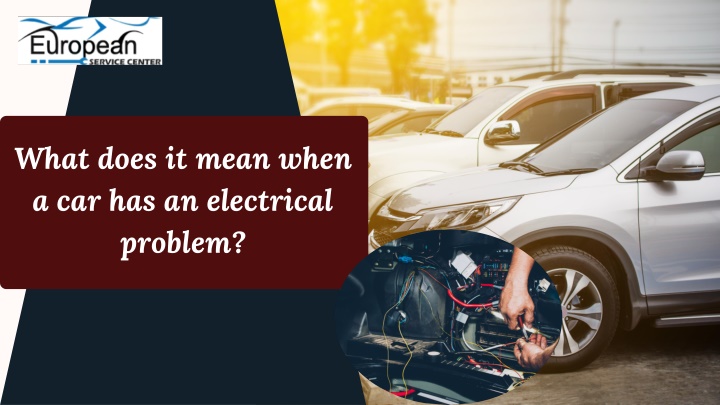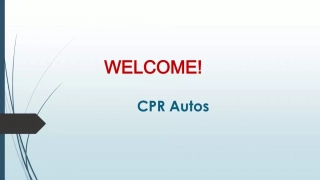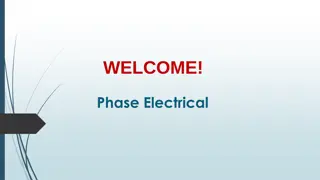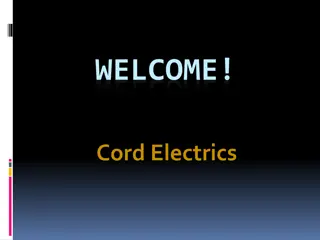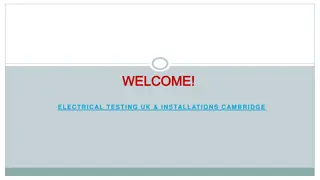What does it mean when a car has an electrical problem
A car with an electrical problem may experience issues like a dead battery, malfunctioning lights, faulty sensors, or starting difficulties. These problems often stem from a weak battery, bad alternator, blown fuses, or wiring faults. Professional di
Download Presentation

Please find below an Image/Link to download the presentation.
The content on the website is provided AS IS for your information and personal use only. It may not be sold, licensed, or shared on other websites without obtaining consent from the author.If you encounter any issues during the download, it is possible that the publisher has removed the file from their server.
You are allowed to download the files provided on this website for personal or commercial use, subject to the condition that they are used lawfully. All files are the property of their respective owners.
The content on the website is provided AS IS for your information and personal use only. It may not be sold, licensed, or shared on other websites without obtaining consent from the author.
E N D
Presentation Transcript
What does it mean when a car has an electrical problem?
A vehicle's electrical system is a complex network of components responsible for powering everything from the engine's ignition to the lights, radio, and advanced onboard computers.
When a car experiences electrical problems, it can lead to frustrating issues such as difficulty starting, flickering lights, malfunctioning accessories, or even complete system failures.
These issues often stem from faulty wiring, a weak battery, alternator failure, or damaged sensors. Understanding the signs and causes of electrical problems is crucial for maintaining vehicle reliability and safety.
In this guide, well explore common electrical issues, their symptoms, and the best solutions to keep your car running smoothly.
Understanding Car Electrical Problems: Causes, Symptoms, and Solutions
1 . COMMON SIGNS OF ELECTRICAL PROBLEMS
Dim or flickering lights, trouble starting, and malfunctioning power windows or radio often indicate an underlying electrical issue that requires immediate attention.
2 . CAUSES OF ELECTRICAL FAILURES IN VEHICLES
Faulty wiring, a weak or dead battery, alternator failure, blown fuses, and corroded connectors are common culprits behind electrical malfunctions in modern vehicles.
3. THE ROLE OF THE BATTERY IN ELECTRICAL ISSUES
A weak or failing battery can lead to difficulty starting the car, loss of power to electrical components, and frequent need for jump-starts.
4. HOW THE ALTERNATOR AFFECTS VEHICLE ELECTRONICS
The alternator charges the battery and powers electrical systems; if it fails, you may notice dimming lights, weak power accessories, or a drained battery.
5 . FAULTY WIRING AND ITS IMPACT ON PERFORMANCE
Damaged or frayed wiring can cause intermittent power loss, short circuits, or system malfunctions, leading to unpredictable performance and safety concerns.
6. BLOWN FUSES AND THEIR CONNECTION TO ELECTRICAL ISSUES
A blown fuse can disable critical vehicle functions like headlights, power windows, or dashboard controls, often signaling an overload or wiring problem.
7 . DIAGNOSING ELECTRICAL PROBLEMS IN YOUR CAR
Using a multimeter, inspecting connections, and testing the battery and alternator voltage can help identify and resolve electrical issues efficiently.
8. PREVENTIVE MAINTENANCE FOR A RELIABLE ELECTRICAL SYSTEM
Regular battery checks, alternator inspections, and keeping electrical connections clean and corrosion-free can prevent unexpected breakdowns and costly repairs.
Regular maintenance and timely diagnostics can help prevent major electrical failures, ensuring your vehicle remains reliable and all electronic components function properly.
If you notice warning signs like dim lights or starting issues, seeking professional assistance can prevent further damage and costly repairs to your car s electrical system.
https://www.europeanservicecenter.com/atlanta- roswell-road-service-center/ 4400 Roswell Rd NE, Atlanta, GA 30342, United States. 404-948-31 39
